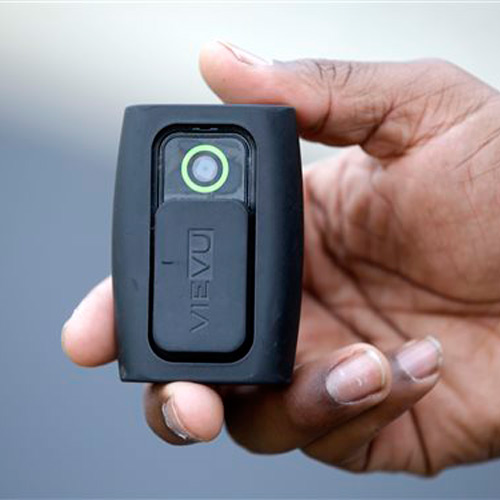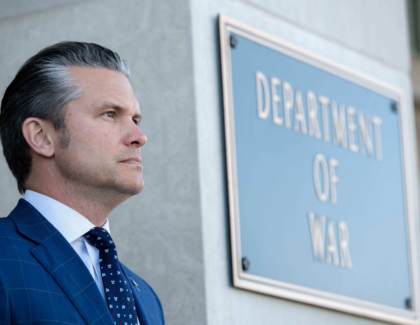Sign up for the daily CJR newsletter.
In the wake of widely publicized incidents of alleged police misconduct and officer-involved shootings, more and more cities around the country are equipping their police officers with body-worn cameras. But something else is happening, too: State lawmakers are setting new rules about who gets access to all that footage.
The debate over how to treat body-cam footage under sunshine laws raises questions about how to balance police accountability and the privacy interests of ordinary citizens. It also carries the risk that the hoped-for benefits of the cameras won’t be realized, if access is restricted too much. Both themes were in play in recent debates in the Midwest.
Earlier this month, the Missouri legislature passed a bill that would permit only body-cam video taken in public spaces to be accessed by the general public; footage taken in private places would be accessible only to those captured in the footage, their families, or their legal representatives. The bill, which would also bar access to body-cam and dash-cam videos while an investigation is ongoing, is awaiting Gov. Jay Nixon’s signature.
Lawmakers in Kansas went even further, exempting all body-cam (and dash-cam) footage from mandatory disclosure under the state open-records law, just as South Carolina did last year. People who are recorded by police videos, and their families and attorneys, will be able to view the footage. But anyone else, including journalists, would have to go to court and argue that release is in the public interest. Gov. Sam Brownback signed the measure into law earlier this month. (Ironically, it was passed along with a reform that expanded the state’s open-records act to include emails sent on private servers for public business—a move that transparency advocates cheered.)
Despite the new restrictions, media groups in both states say the outcomes could have been worse. Doug Crews, former executive director of the Missouri Press Association, pointed out to the Associated Press that legislators had pushed for barring access to all footage last year.
In Kansas, attorney Max Kautsch, who represents the state’s press association, said a legislative proposal filed last year would have deemed all footage “confidential”—with no legal avenue for media or the general public to obtain it. But, he says, a judicial committee convened last summer to evaluate that bill ultimately agreed that would go too far. Under the committee’s proposal, which would provide the basis for the bill signed this month, the state law will now “provide bases for both non-disclosure of video footage by law enforcement and a court challenge to such non-disclosure,” Kautsch wrote in a blog post.
“Should it be better? Yeah, it should be better,” Kautsch told CJR. “This is sort of a middle ground.”
Kautsch credits a police lobbyist with helping to find compromise in Kansas, restrictive though the bill is. In the debate over access to the recordings, however, media groups and transparency advocates can find themselves in opposition to law enforcement–and police tend to have sway in the legislatures. “What I see at the state level is that the police lobby is stronger than the press lobby,” says Chad Marlow, advocacy and policy counsel at the ACLU.
But the proliferation of body-cams also raises some hard questions about privacy that can cause differences of opinion among transparency advocates. For example, when University of Missouri professor Melissa Click was fired earlier this year, school officials cited not just her altercation with a student videographer but also a separate incident, captured on a body-cam, in which she cursed at police during a heated campus demonstration. That footage became public when it was obtained via a records request by the Columbia Missourian. (Because the incident occurred in a public place, the video would have been accessible under the new law, too.)
In Marlow’s view, the release of the Click video is contrary to the purpose of body-cams, which is to document police behavior. “In that case, it’s capturing a person engaging in constitutionally protected speech, and then they get punished for it,” he said. “The idea isn’t to create a record of everybody’s behavior in public.”
Missouri’s new bill attempts to address privacy concerns by simply barring release of video taken in “nonpublic” spaces. But from Marlow’s perspective, this solution is both too restrictive and does too little to protect citizens from unwarranted exposure: Video of an officer-involved shooting that takes place in a private home, for instance, would be a closed record, unless a court rules otherwise, while video of a trivial but embarrassing moment in a public space would be an open record.
The ACLU, which advocates both for privacy and transparency, has crafted model body-cam legislation that attempts to balance transparency and privacy concerns. Under the ACLU bill, body-cam video would be deleted after six months and exempt from public disclosure unless it meets certain criteria, such as “use of force” or events leading up to a felony arrest. The group has praised measures that became law last year in Oklahoma and Illinois which bear similarities to the model legislation.
In other states, meanwhile, laws about access to body-cam footage are ambiguous. That’s the case in Iowa, where the issue is currently the subject of a legal battle. After a police officer accidentally shot and killed a Burlington, Iowa, woman in January 2015, the local newspaper The Hawk Eye joined the family of the deceased in appealing to the state’s public information board to obtain the complete body-cam footage of the incident.
The board ruled in favor of the petitioners in December, and has appointed a special prosecutor to argue before an administrative judge for release of the footage. But the case could drag on for months, or even years, if there is an appeals process.
Meanwhile, the Iowa Freedom of Information Council, an advocacy coalition founded by media groups, has urged state lawmakers to follow the example of Illinois, where footage may be released only when it shows use of force, discharge of a weapon, or death. This approach provides a “reasonable balancing of privacy and accountability,” the council’s executive director, Randy Evans, told The Des Moines Register.
Not all transparency advocates agree that police cameras should be treated as a special category. In December, researchers at Yale’s Media Freedom and Information Access Clinic argued in a white paper that existing freedom-of-information laws are sufficient to protect citizens’ privacy, and that state legislatures should not enact any restrictions on body-cam access.
But Kathleen Richardson, a longtime advocate in Iowa who was Evans’s predecessor at the Freedom of Information Council—and, who, as a member of the state public information board, voted in favor of releasing the Burlington video—says the cameras raise privacy concerns that are worth addressing.
“Many of us are starting to realize that even though in most cases there is public interest in the release of video… there is a lot of sensitive information involved,” Richardson said. Given “the nature of the records here, the sensitivity of the information, and also the fact that this can be published immediately and seen all over the world.… it behooves us as a society to have a broader discussion.”
Sometimes, of course, these legitimate concerns may be exploited to prevent the release of video that should be public. For journalists, one takeaway is that they can’t realistically expect unfettered access to body-cam video. Reporters will have to be judicious about how they use the footage–and be prepared to put up a fight to get it.
Has America ever needed a media defender more than now? Help us by joining CJR today.







